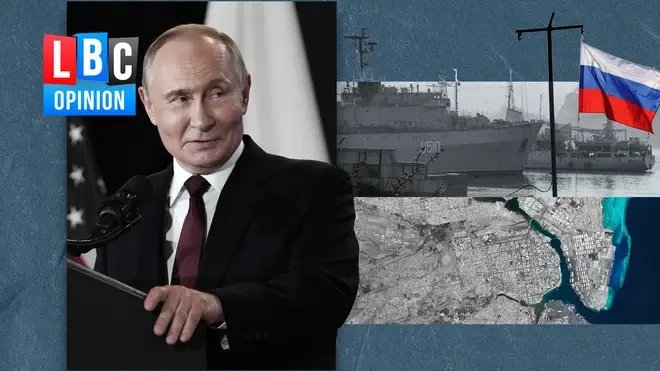How Sudan is giving Russia the Red Sea.

Reader mode
How Sudan is giving Russia the Red Sea
lbc.co.uk
2d
The proposal grants Russia permission to build and operate a Naval Technical and Logistical Support Point (PMTO) at Port Sudan, one of the country's most strategically located harbours on the Red Sea.
Sudan is moving toward a strategic military deal with Russia amid growing regional concerns.
Sudan's transitional authorities are moving ahead with a long-term strategic cooperation agreement with Russia that would allow Moscow to establish a naval logistics hub on the Red Sea. This deal has triggered alarm among Western and regional powers concerned about expanding Russian influence in the region.
According to a draft of the Strategic Cooperation and Comprehensive Partnership Agreement, reviewed by Erem News, the proposal grants Russia permission to build and operate a Naval Technical and Logistical Support Point (PMTO) at Port Sudan, one of the country's most strategically located harbours on the Red Sea.
Under the draft, the facility would be limited to supplying, repairing, and refuelling Russian warships. The agreement would remain in force for 25 years, automatically renewable for five-year periods, and would allow up to four Russian naval vessels to dock simultaneously. The maximum number of Russian military and technical personnel permanently based at the site would not exceed 300.
In return, Russia would provide Sudan's armed forces with advanced defensive weapons systems, including air defence platforms, reconnaissance equipment, and armoured vehicles, either at preferential prices or through flexible financing arrangements.
Moscow would also train Sudanese forces in the operation and maintenance of Russian equipment and offer free technical support and naval training. Additionally, the deal gives Russian companies priority access to new gold and precious metal concessions across Sudan.
Legal and Political Concerns
Legal experts and political analysts say the draft agreement contains serious weaknesses and potential constitutional violations. Critics argue that signing a 25-year military accord through Sudan's unelected transitional council raises questions about legitimacy and long-term accountability.
"The document is vaguely worded and leaves key details undefined," one political observer in Khartoum said. "This could allow Moscow to interpret the terms in ways that extend its influence far beyond what Sudan intended."
The draft also appears to sideline Sudan's traditional allies, including Egypt, Saudi Arabia, Qatar, and Turkey, who are seen as crucial backers of General Abdel Fattah al-Burhan, head of Sudan's ruling military council.
A potential Russian naval foothold on the Red Sea, experts warn, would provoke strong reactions from Washington, Cairo, and Riyadh, all of which view the waterway as a key strategic corridor.
Moscow's Strategic Gain, Khartoum's Political Gamble
Analysts believe the agreement would hand Russia a significant strategic advantage by securing a permanent military presence on the Red Sea - its first on the African coast - under the benign label of a "logistical support point."
The draft text's lack of geographical specificity, leaving the facility's exact location to be determined later, could give Moscow flexibility to expand the site into a fully operational naval base in the future.
"This would effectively anchor Russia on one of the world's busiest maritime trade routes," said a regional security expert. "It's a game changer in terms of influence - but potentially disastrous for Sudan's regional diplomacy."
Despite these risks, General al-Burhan appears eager to finalise the agreement. Observers say he sees the deal as a way to secure Russian military backing in Sudan's internal power struggle against the Rapid Support Forces (RSF), led by his rival, Mohamed Hamdan Dagalo (Hemedti).
However, diplomats caution that such a move could further isolate Sudan internationally, strain relations with the United States and key Arab partners, and possibly invite economic sanctions or aid restrictions.
Regional Repercussions
A Russian presence on the Red Sea would represent a major geopolitical shift, placing Moscow within reach of key shipping lanes and near Saudi Arabia, Egypt, and the Horn of Africa.
For Sudan, already torn by civil conflict and struggling with economic collapse, the agreement could deepen its dependence on foreign powers and complicate efforts to rebuild international trust.
"This is not just a military agreement," said one Sudanese analyst. "It's a geopolitical statement - and one that could come at a very high cost."



0 Comments